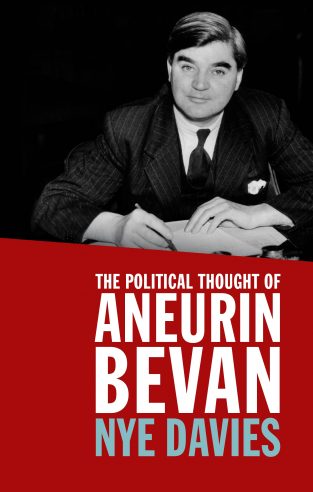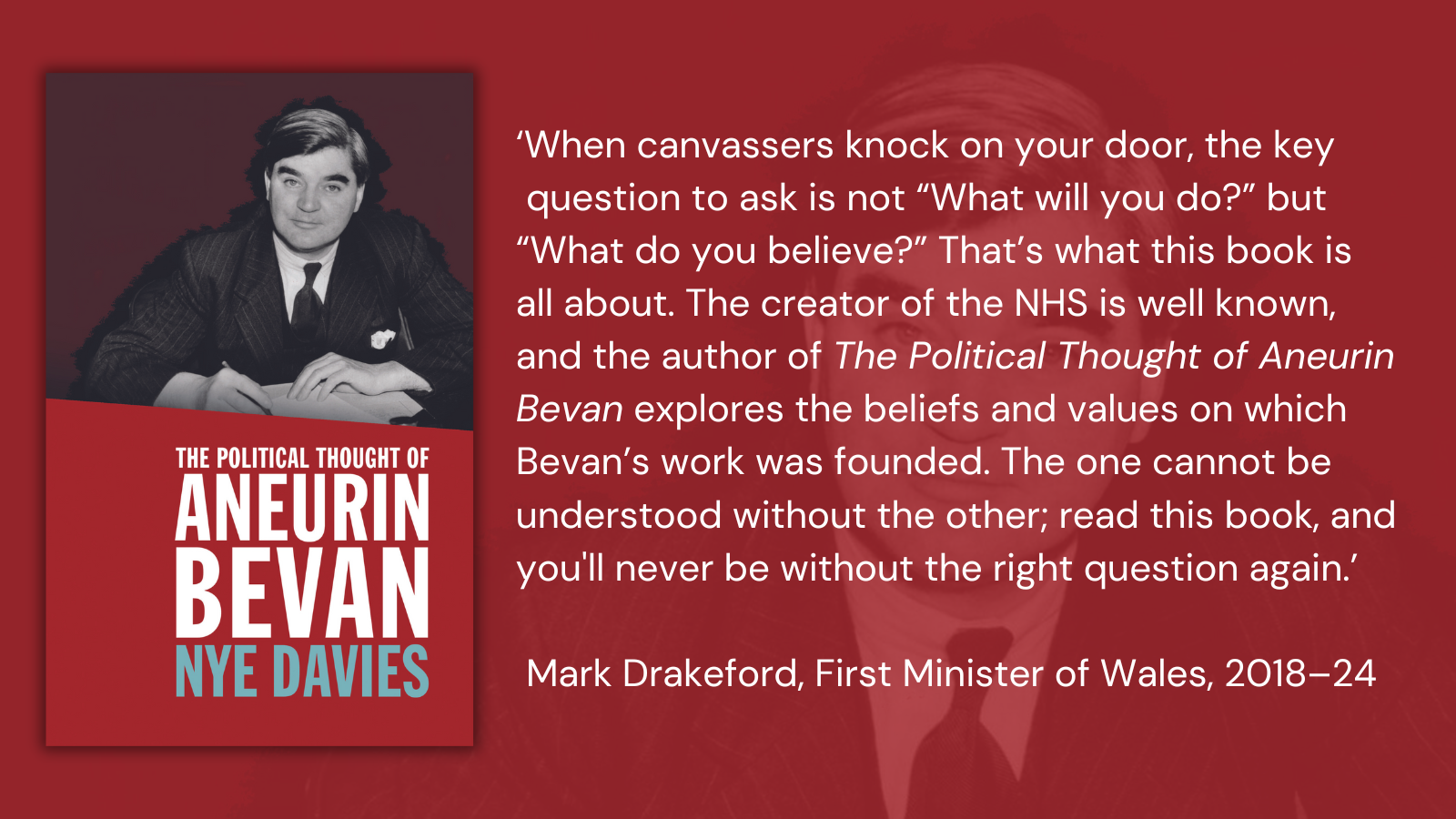Book Release: The Political Thought of Aneurin Bevan
16 September 2024
Aneurin Bevan is one of the most widely quoted politicians in the UK. A powerful orator and engaging writer, Bevan’s most recognised one-liners have been printed on a variety of paraphernalia for decades. His role in founding the NHS has secured him a permanent legacy, with both national plays and TV films being made about his achievements.
On his appointment as Secretary for Health and Social Care in Welsh First Minister Eluned Morgan’s new cabinet, Jeremy Miles posed in front of a mural in Tredegar featuring Bevan alongside the famous (and untraceable) Bevan line “We are going to Tredegarise you”. In Wales in particular, the job of Health Secretary is one with a significant history.
Bevan is also a politician regularly repurposed by politicians from across the ideological spectrum. For instance, Conservative Shadow Chancellor Jeremy Hunt invoked Bevan during his battle with junior doctors when he was Health Secretary, while Plaid Cymru politicians have championed Bevan’s legacy when setting out their policies.
Within the Labour Party, when ideological disputes rise to the surface Bevan becomes a battleground for opposing factions. For some, emphasis is placed on his radical socialist principles, while others point to Bevan as a pragmatic institution builder. It appears Bevan can be many things to many people.
Bevan as a political thinker
In The Political Thought of Aneurin Bevan, published this week by the University of Wales Press, I seek to move beyond the debates over Bevan’s legacy and instead focus on Bevan’s ideas. Treating Bevan as a political thinker provides a new approach to the study of such a significant politician, and provides fresh insight into the nuances of his political thought.
The book identifies several key elements that underpinned Bevan’s politics, such as the importance of Marxism in formulating his understanding of class conflict; his vision of Parliament as a weapon in the class struggle; his plans for changing the state and implementing principles of economic planning; his hopes for world peace; and his conceptualisation of democratic socialism. The analysis locates Bevan within the Labour Party’s ideological traditions, demonstrating where Bevan fitted comfortably within labourism, but also where he challenged it.
Although Bevan sacrificed certain principles for political expediency – complete consistency is difficult for a politician to achieve – core assumptions on the economy, politics and the international world remained central to his outlook. Bevan’s political thought was unsystematic and sometimes incoherent, but there was an underlying foundation that guided it. His radical vision of the world, which emphasised class conflict and the necessity of economic planning, often put him at odds with his Labour colleagues, yet he consistently argued in the pages of Tribune and elsewhere for the Labour Party to be more vigorous in arguing for socialism.
The language of priorities and the religion of Bevan
Why then, over sixty years after Bevan’s death, do his ideas matter? There is certainly not a lack of material on Bevan, so why is a book on his political thought necessary?
This again comes down to his significant legacy. Bevan is still invoked today and will be for many years to come, therefore it is important to move beyond the one-liners and engage critically with what he had to say. This is for two reasons: firstly to avoid misinterpreting Bevan or doing him an injustice when engaging with his work; and secondly, to potentially learn from someone who thought deeply about social, political and economic questions.
When it comes to the first reason, it is quite clear to see how a failure to engage with Bevan’s ideas in a considered way leads to his politics being misused. Let’s take one of Bevan’s most quoted lines: “The language of priorities is the religion of socialism”.
In a 2023 speech to the Labour Party’s National Policy Forum, Keir Starmer invoked the memory of Bevan when urging his party to prioritise its regaining of power after fourteen years of Conservative Party rule. He talked of seizing power as being his “ultimate duty”, declaring that:
The “language of priorities” is our religion, everyone remembers that quote from Nye Bevan. But they sometimes forget the rest of his argument in that speech. That “only by the possession of power can you get your priorities correct”.
That’s what he said – and he was right. We’re nothing without power.
It is a line that’s been used by several Labour politicians over the years, including the new Welsh Labour leader and First Minister Eluned Morgan. In 2021, while Welsh Government Health Secretary, Morgan used Bevan’s line to explain why the government could not provide wage rises to nurses. More recently, Morgan utilised it in relation to tight budgets:
One of the toughest jobs in politics is about prioritisation. That’s what Nye Bevan said, wasn’t it?
‘The language of priorities is the religion of Socialism’
In both instances, Bevan’s quote has been misrepresented by the Labour leaders. In Starmer’s case, not only does he miss out the word socialism, but the power Bevan was referring to was not about winning elections. Bevan was talking about “power in society” and power over the economy. It was a statement of action, for government intervention, and a statement about the role a democratic socialist party should play:
“If we managed to get a majority in Great Britain by the clever exploitation of contemporary psychology, and we did not get the commanding heights of the economy in our power, then we did not get the priorities right. The argument is about power and only about power, because only by the possession of power can you get the priorities correct”.
In the case of Eluned Morgan, a radical statement for change has been reduced to a statement of budget management. Reducing such a line to a soundbite and removing it from its context does a disservice to the actual argument Bevan was trying to make.
Bevan today
When it comes to considering Bevan today, some might argue that the ideas of the past are irrelevant to the challenges of contemporary politics. The book does not argue that Bevan offers solutions to all of our current problems, but it makes the case that for someone with such a powerful legacy, it is important to thoughtfully and critically consider his full vision.
Take the NHS for example: Bevan’s legacy is often reduced to ‘founder of the NHS’ while the ‘values and principles of Bevan’ that are invoked usually relate to the NHS being free at the point of use. But the service was just one aspect of Bevan’s vision to improve lives. As I argued in Planet, reengaging with Bevan’s ideas might help us see how the service can be reconsidered in the face of its current challenges.
By taking this unique approach to studying Bevan it is hoped that his politics and ideas will not be lost and that his vision will remain in the remembrance of him.
In 1921, aged just twenty-four, Bevan wrote a review of the Communist Manifesto. While praising the document, Bevan stressed that “like all historic documents, it is at the mercy of the march of time”. He warned that it would be a misunderstanding to “give its findings the rigidity of a dogma or to make it anything like a touchstone for all time”. Yet, the “highest tribute possible” would be paid to its authors by recognising its limitations but taking up the challenge that they laid down. “And how better can we gain inspiration,” Bevan asked, “than by turning to the Manifesto” and “catching some of the fire which still glows in its pages?”
We would be paying Bevan the highest tribute by seriously and critically engaging with his ideas, his findings and his vision. By doing so, we can catch the fire that glowed within him.
The Political Thought of Aneurin Bevan is available to buy from University of Wales Press: https://www.uwp.co.uk/book/the-political-thought-of-aneurin-bevan/
This is My Truth: Aneurin Bevan in Tribune, released in 2023, is also available to buy from University of Wales Press: https://www.uwp.co.uk/book/this-is-my-truth/

- December 2025
- November 2025
- October 2025
- September 2025
- June 2025
- May 2025
- March 2025
- February 2025
- December 2024
- October 2024
- September 2024
- July 2024
- June 2024
- December 2023
- November 2023
- August 2023
- February 2023
- December 2022
- November 2022
- September 2022
- July 2022
- April 2022
- March 2022
- January 2022
- October 2021
- July 2021
- May 2021
- March 2021
- January 2021
- November 2020
- October 2020
- August 2020
- July 2020
- June 2020
- May 2020
- April 2020
- March 2020
- October 2019
- September 2019
- June 2019
- April 2019
- March 2019
- February 2019
- December 2018
- October 2018
- July 2018
- June 2018
- April 2018
- December 2017
- October 2017
- July 2017
- June 2017
- May 2017
- April 2017
- March 2017
- February 2017
- January 2017
- December 2016
- November 2016
- October 2016
- September 2016
- Bevan and Wales
- Big Data
- Brexit
- British Politics
- Constitution
- Covid-19
- Devolution
- Elections
- EU
- Finance
- Gender
- History
- Housing
- Introduction
- Justice
- Labour Party
- Law
- Local Government
- Media
- National Assembly
- Plaid Cymru
- Prisons
- Reform UK
- Rugby
- Senedd
- Theory
- Uncategorized
- Welsh Conservatives
- Welsh Election 2016
- Welsh Elections